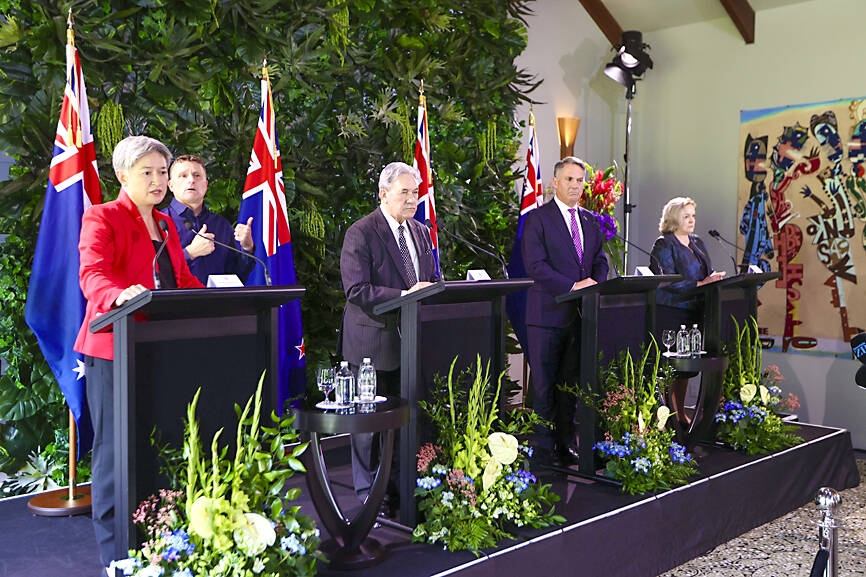The Ministry of Foreign Affairs yesterday expressed its appreciation for the Australia-New Zealand Foreign and Defence Ministers Consultations’ (ANZMIN) joint statement reaffirming the importance of peace and stability across the Taiwan Strait.
New Zealand Deputy Prime Minister and Minister of Foreign Affairs Winston Peters and New Zealand Minister of Defense Judith Collins hosted Australian Deputy Prime Minister and Minister for Defence Richard Marles and Australian Minister for Foreign Affairs Penny Wong in Auckland for the second ANZMIN on Friday.
The ministers issued a joint statement after the meeting, in which they reiterated the importance of peace and stability across the Taiwan Strait and their shared opposition to unilateral changes to the “status quo,” the ministry said, adding that it welcomes and appreciates the statement.

Photo: AP
The joint statement says the ministers “called for the peaceful resolution of cross-Strait issues through dialogue, without the threat or use of force or coercion.”
“They also reiterated their will to continue deepening relations with Taiwan in the economic, trade and cultural fields, as well as enhancing development coordination in the Pacific,” it says.
The ministry said Australia and New Zealand are Taiwan’s important friends in the Indo-Pacific region, and that there has been great progress in bilateral relationships with the two nations in recent years.
Maintaining peace and stability across the Taiwan Strait and the South China Sea has become a global consensus, so the ministry welcomes the international society’s continuous expression of concern and them taking action in protecting the rule-based international order, the ministry said.
Taiwan remains committed to promoting values-based diplomacy and jointly safeguarding democracy, peace and prosperity in the Indo-Pacific, it said.
In other news, the ministry yesterday said it welcomed a World Medical Association (WMA) delegation, which included WMA president Ashok Philip, council chair Jung Yul Park and secretary-general Otmar Kloiber.
Deputy Minister of Foreign Affairs Tien Chung-kwang (田中光) met with the delegation on Friday, welcoming them to Taiwan and expressing gratitude to the association for consistently supporting Taiwan’s participation in the WHO and its related mechanisms over the years, the ministry said.
Tien also said he hoped that Taiwan can cooperate with the WMA in other global healthcare issues and that Taiwanese physicians can form deeper partnerships with the association in the future, the ministry said.
“Taiwan is a force for good in the international society, willing to share our resources and experiences, such as donating medical resources to more than 80 countries during the [COVID-19] pandemic and pushing forward the ‘one country, one [medical] center’ program to help other countries improve their healthcare quality,” the ministry quoted Tien as saying.
Philip praised the nation’s advanced healthcare development and stressed the importance of Taiwan’s participation in the global health system, the ministry said.
South Korea had learned from Taiwan’s healthcare system, it cited Park as saying, adding that he had said he would be glad to see Taiwan included in international society.
Meanwhile, Kloiber said Taiwanese healthcare development ranks high and that its participation in the global public health system would be beneficial to the nation and the world, the ministry said.

Chinese Nationalist Party (KMT) Chairman Eric Chu (朱立倫), spokeswoman Yang Chih-yu (楊智伃) and Legislator Hsieh Lung-chieh (謝龍介) would be summoned by police for questioning for leading an illegal assembly on Thursday evening last week, Minister of the Interior Liu Shyh-fang (劉世芳) said today. The three KMT officials led an assembly outside the Taipei City Prosecutors’ Office, a restricted area where public assembly is not allowed, protesting the questioning of several KMT staff and searches of KMT headquarters and offices in a recall petition forgery case. Chu, Yang and Hsieh are all suspected of contravening the Assembly and Parade Act (集會遊行法) by holding

PRAISE: Japanese visitor Takashi Kubota said the Taiwanese temple architecture images showcased in the AI Art Gallery were the most impressive displays he saw Taiwan does not have an official pavilion at the World Expo in Osaka, Japan, because of its diplomatic predicament, but the government-backed Tech World pavilion is drawing interest with its unique recreations of works by Taiwanese artists. The pavilion features an artificial intelligence (AI)-based art gallery showcasing works of famous Taiwanese artists from the Japanese colonial period using innovative technologies. Among its main simulated displays are Eastern gouache paintings by Chen Chin (陳進), Lin Yu-shan (林玉山) and Kuo Hsueh-hu (郭雪湖), who were the three young Taiwanese painters selected for the East Asian Painting exhibition in 1927. Gouache is a water-based

Taiwan would welcome the return of Honduras as a diplomatic ally if its next president decides to make such a move, Minister of Foreign Affairs Lin Chia-lung (林佳龍) said yesterday. “Of course, we would welcome Honduras if they want to restore diplomatic ties with Taiwan after their elections,” Lin said at a meeting of the legislature’s Foreign Affairs and National Defense Committee, when asked to comment on statements made by two of the three Honduran presidential candidates during the presidential campaign in the Central American country. Taiwan is paying close attention to the region as a whole in the wake of a

OFF-TARGET: More than 30,000 participants were expected to take part in the Games next month, but only 6,550 foreign and 19,400 Taiwanese athletes have registered Taipei city councilors yesterday blasted the organizers of next month’s World Masters Games over sudden timetable and venue changes, which they said have caused thousands of participants to back out of the international sporting event, among other organizational issues. They also cited visa delays and political interference by China as reasons many foreign athletes are requesting refunds for the event, to be held from May 17 to 30. Jointly organized by the Taipei and New Taipei City governments, the games have been rocked by numerous controversies since preparations began in 2020. Taipei City Councilor Lin Yen-feng (林延鳳) said yesterday that new measures by